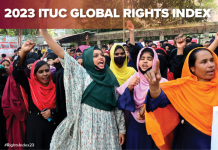The COVID-19 pandemic has devastated jobs, communities and lives. Governments and employers have exploited the pandemic to dismiss workers who exposed vital information about the spread of the virus in workplaces; violated collective bargaining rights; increased surveillance of workers and undermined the right to privacy; and restricted free speech and assembly. The 2021 Global Rights Index documents a shameful roll call of governments and companies who have pursued an anti-union agenda in the face of workers who have stood on the front line providing essential work to keep economies and communities functioning.
The breakdown of the social contract between workers, government and business has seen the number of countries where authorities impeded the registration of unions increased from 89 countries in 2020 to 109 countries in 2021, with state repression of independent union activity in Belarus, Egypt, El Salvador, Jordan, Hong Kong, Kyrgyzstan and Iraq. To deny workers the right to representation in the midst of a global pandemic is abhorrent.
The eighth edition of the ITUC Global Rights Index ranks 149 countries on the degree of respect for workers’ rights. For the first time, the 2021 ITUC Global Rights Index has an interactive www.globalrightsindex. org where cases of violated rights and national ratings can be viewed by country and region. A comprehensive review of workers’ rights in law in 149 countries provides the only database of its kind.
Five new countries have been included for the first time in 2021: Armenia, Gabon, Guinea, Kyrgyzstan and Niger. Saudi Arabia has not been rated in the 2021 Global Rights Index while the extent of its new Labour Reform Initiative is assessed and implemented.
Eight-year trend data analysed in the 2021 Global Rights Index exposes attacks on the right to strike and the right to establish and join a trade union, as well as on the registration of unions; arbitrary arrests and detentions; and the denial of freedom of speech and assembly, which is at an all-time high.
Eighty-seven per cent of countries have violated the right to strike. Strikes in Belarus, Indonesia and the Philippines to oppose authoritarian governments and in Myanmar to oppose the military junta have been met with brutal repression.
Seventy-nine per cent of countries have violated the right to collective bargaining. In all regions, collective bargaining is being eroded and is used by authoritarian governments in Belarus, Brazil, Honduras, Hungary and Hong Kong to dismantle a key tenet of workplace democracy.
Seventy-four per cent of countries excluded workers from the right to establish and join a trade union. In 2021, thirty-two countries had legislation prohibiting migrants from establishing and joining trade unions, restricting migrants’ ability to hold office in a trade union or otherwise denying them full rights to engage in union activities. The practice of union-busting has seen more and more workers blocked from being able to form and join trade unions. In 2020, Uber, Lyft and DoorDash mounted the most expensive such campaign in California’s history, Proposition 22, to fight AB5, a new state law that classified certain categories of gig workers as employees.
The ten worst countries for workers in 2021 are the following: Bangladesh, Belarus, Brazil, Colombia, Egypt, Honduras, Myanmar, the Philippines, Turkey and Zimbabwe.

Belarus and Myanmar are new entries in 2021. Myanmar has joined this group for the first time. Belarus was one of the ten worst countries in 2015 and 2016 and makes a return in 2021.
Belgium, Canada, El Salvador, Haiti, Hungary, Jordan, Malaysia, Myanmar and Slovakia have all seen their ratings worsen in 2021. Myanmar has increased to category 5+, No guarantee of rights, due to the breakdown of the rule of law.
Eight countries have seen their ratings improve: Bolivia, Bosnia and Herzegovina, Greece, Mexico, North Macedonia, Panama, Sudan and Togo.
Trade unionists were killed in six countries: Brazil, Colombia, Guatemala, Myanmar, Nigeria and the Philippines. With three of the six countries, the Americas is the deadliest region for workers. Twenty two trade unionists were murdered in Colombia alone. Workers were exposed to violence in 45 countries.
The number of countries where freedom of speech and assembly was denied or constrained increased from 56 in 2020 to 64 in 2021, with extreme cases reported in Hong Kong and Myanmar.
Workers had no or restricted access to justice in 65% of countries, with severe cases reported in Belarus, Honduras, the Philippines and Zimbabwe.
Workers experienced arbitrary arrests and detentions in 68 countries. Trade union leaders from Cambodia, Hong Kong and Myanmar were among high profile arrests in 2021.
Surveillance of workers and attacks on the right to privacy are on the rise. In the USA, Amazon, Facebook and Google have been exposed using illegal or underhand surveillance activities. Amazon’s surveillance of workers in Europe and the USA has become a global scandal.
It will take a New Social Contract with jobs, rights, social protection, equality and inclusion to rebuild the trust that has been shattered by repressive governments and abusive companies. While there have been some positive legislative developments from the PRO Act in the USA, to processes for a due diligence legislation in the European Union which would hold companies to account, much more needs to be done.
Workers have been on the front lines of the global pandemic holding communities together. If governments don’t look after workers with rights and labour protections, workers can’t look after the economy. The risk to our democracies and economies is too much of a threat for governments to ignore.
You can read the report here.
Sharan Burrow
General Secretary
International Trade Union Confederation






